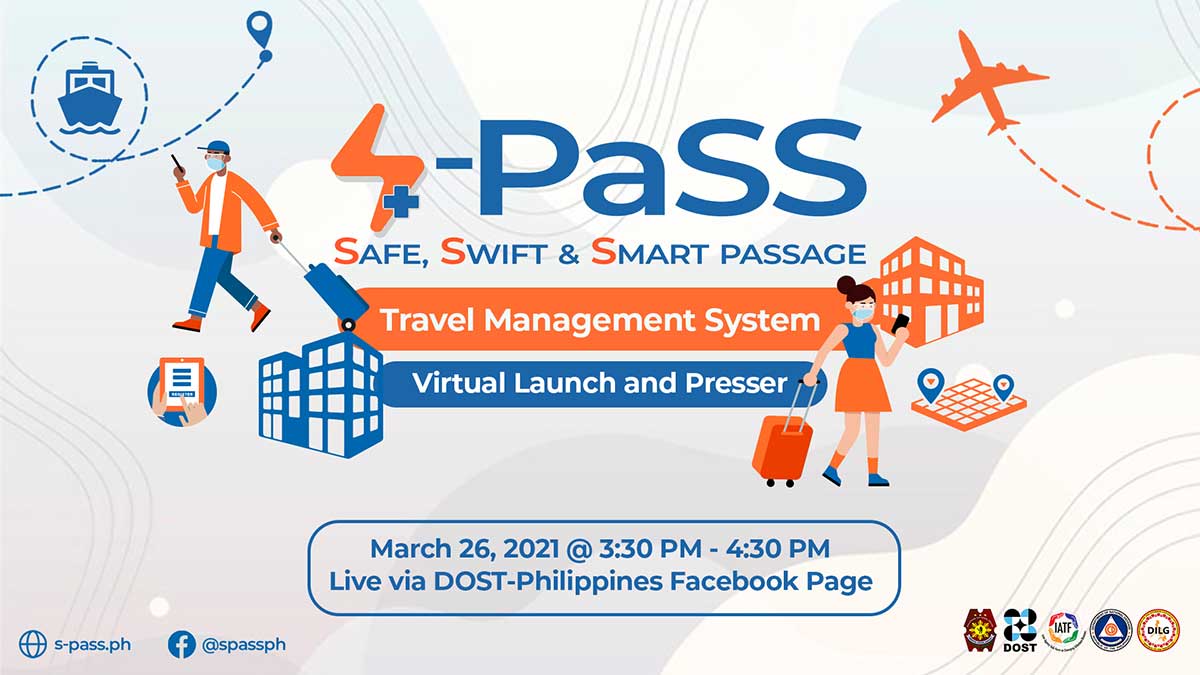
Are you traveling somewhere in the Philippines? Check for travel requirements and policies of Local Government Units (LGUs) and apply for travel permits if needed in a fast, easy and smart way through S-PaSS.
With the recent issuance of the IATF Resolution No. 101, the S-PASS (Safe, Swift and Smart Passage) Travel Management System was institutionalized by the Inter-Agency Task Force (IATF) for the Management of Emerging Infectious Diseases as a one-stop-shop communication and coordination platform for travelers and LGUs.
The Department of Science and Technology (DOST) developed S-PaSS to improve travel coordination by providing a common and unified platform for communicating travel policies and requirements set by the Provincial LGUs, Highly Urbanized Cities (HUCs) and Independent Component Cities (ICCs). It facilitates the application process of necessary travel permits needed before travel if required, depending on the travel policy of the destination LGU.
S-PaSS is an online travel management system and is not a contact tracing app. Only those who intend to travel need to use S-PaSS. The traveler needs to have an internet-capable device such as desktop computer, laptop, table or mobile phone. The traveler will need to go to s-pass.ph website in order to register and use the system and a personal mobile number is also needed for registration.
However, if the traveler is going to a destination LGU with “Unrestricted” travel policy, there is no need to register and use S-PaSS since no travel documents are required. If the traveler is going to an LGU with “Restricted” travel policy, application for a Travel Coordination Permit (TCP) is required. When traveling to an LGU with “Unrestricted” travel policy but passing through areas with strict travel protocols, DOST recommends that a Travel Pass-Through Permit (TPP) be generated to be presented to the appropriate authorities when requested.
The destination LGU approves the application for a TCP. The approval process depends on the completeness of the documents submitted to the LGU and its own processing time. Travelers need to follow up with the LGU on the status of their applications. S-PaSS has no control on the approval process but assists by notifying LGUs of pending applications. The TPP on the other hand does not need any approval. It is a document that is automatically generated by S-PaSS. The TCP and TPP are digital documents that are sent to the user’s S-PaSS account. These can be stored in the mobile phone for showing to authorities during inspection. These documents can also be printed in paper and carried physically during the travel. The TCP or TPP can be checked by authorities through scanning the QR codes in the said documents. Unique QR code is generated every time the TCP or TPP is issued to a traveler.
Previously, the LGUs issue the Travel Authority to local travelers including returning Overseas Filipino Workers, locally stranded individuals, and emergency travelers. With the adoption of S-PaSS by the IATF, S-PaSS will allow the LGUs now to issue the TCP to replace the previously required Travel Authority.
Currently, not all LGUs are using S-PaSS. If the LGU is not using S-PaSS, the traveler cannot apply for a TCP to the destination LGU if it has a “Restricted” travel policy. The traveler is advised to contact directly the LGU to coordinate his or her travel.
The virtual launching of S-Pass is set today, March 26 at 3:30PM via DOST-Philippines Facebook page. The virtual event will be attended by high-ranking officials from the DOST, Department of Interior and Local Government (DILG), League of Provinces of the Philippines (LPP), League of Cities of the Philippines (LCP), local chief executives, the media partners and other stakeholders.
For more inquiries on S-PaSS, you may contact the following hotline numbers: 0939-6067375 and 0998-5354217. Travels are made easier through S-PaSS! Register now at www.s-pass.ph for a hassle-free journey. (Sol Salazar/DOST VI-KMU)





















